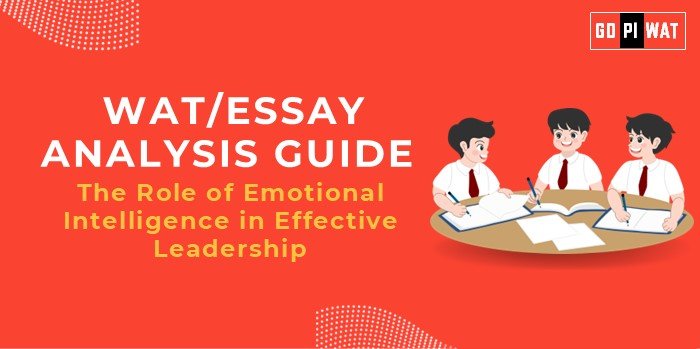🌟 The Role of Emotional Intelligence in Effective Leadership
🌐 Understanding Emotional Intelligence’s Importance
Emotional Intelligence (EI) is a crucial determinant of effective leadership, aligning with contemporary management challenges such as team motivation, organizational culture, and conflict resolution.
📝 Effective Planning and Writing
- ⏳ Time Allocation:
- Planning: 5 minutes
- Writing: 20 minutes
- Review: 5 minutes
- 📋 Preparation Tips:
- Include statistics (e.g., “70% of leadership success is EI-based”).
- Reference frameworks (Daniel Goleman’s five pillars).
- Use global examples of EI’s application in leadership.
💡 Introduction Techniques for Essays
- 🔄 Contrast Approach: “While traditional leadership prioritized authority, modern leadership relies on Emotional Intelligence to connect, inspire, and achieve success.”
- 🔧 Solution-Based Approach: “As organizations face rising employee burnout, Emotional Intelligence emerges as a solution for empathetic leadership and team performance.”
- 📖 Quote-Based Approach: “Daniel Goleman rightly said, ‘Without Emotional Intelligence, leaders can’t fully engage their teams.’”
📖 Structuring the Essay Body
✔️ Paragraph 1: Achievements
EI enhances team morale, decision-making, and conflict resolution. For instance, Microsoft improved team efficiency by 25% after introducing EI leadership training.
⚠️ Paragraph 2: Challenges with Comparative Analysis
Measuring EI remains inconsistent. While companies in the USA lead in EI training, many developing economies still focus on technical skills, creating a gap in leadership development.
🔮 Paragraph 3: Future Outlook
Leaders with EI will dominate future workplaces. Recommendations include integrating EI into corporate training programs to prepare future leaders for dynamic challenges.
📌 Concluding Effectively
- ⚖️ Balanced Conclusion: “Emotional Intelligence complements technical skills, enabling leaders to inspire teams and achieve organizational success.”
- 🌏 Global Comparison Conclusion: “As seen in global examples like Microsoft and Japanese leadership models, EI is essential for future leadership success.”
📊 Analyzing Successes and Shortcomings
- 🏆 Key Achievements: Improved team performance, conflict reduction, and decision-making.
- 📏 Ongoing Challenges: Lack of assessment tools and resistance to soft-skills training.
- 🌍 Global Context: The USA and Japan lead in EI adoption, while developing nations lag.
🌱 Recommendations for Sustainable Progress
- 📖 Integrate EI assessments into leadership development programs.
- 🔧 Promote EI training alongside technical skill-building for future managers.
📝 Sample Short Essays on Emotional Intelligence
✔️ Balanced Perspective
“While technical expertise is vital, Emotional Intelligence ensures leaders connect with teams, resolve conflicts, and make impactful decisions, driving organizational growth.”
🔧 Solution-Oriented
“By integrating Emotional Intelligence into leadership training, companies can foster resilient, motivated, and high-performing teams.”
🌍 Global Comparison
“Leadership success in organizations like Microsoft and Japanese companies highlights the need for Emotional Intelligence to balance empathy with efficiency.”


